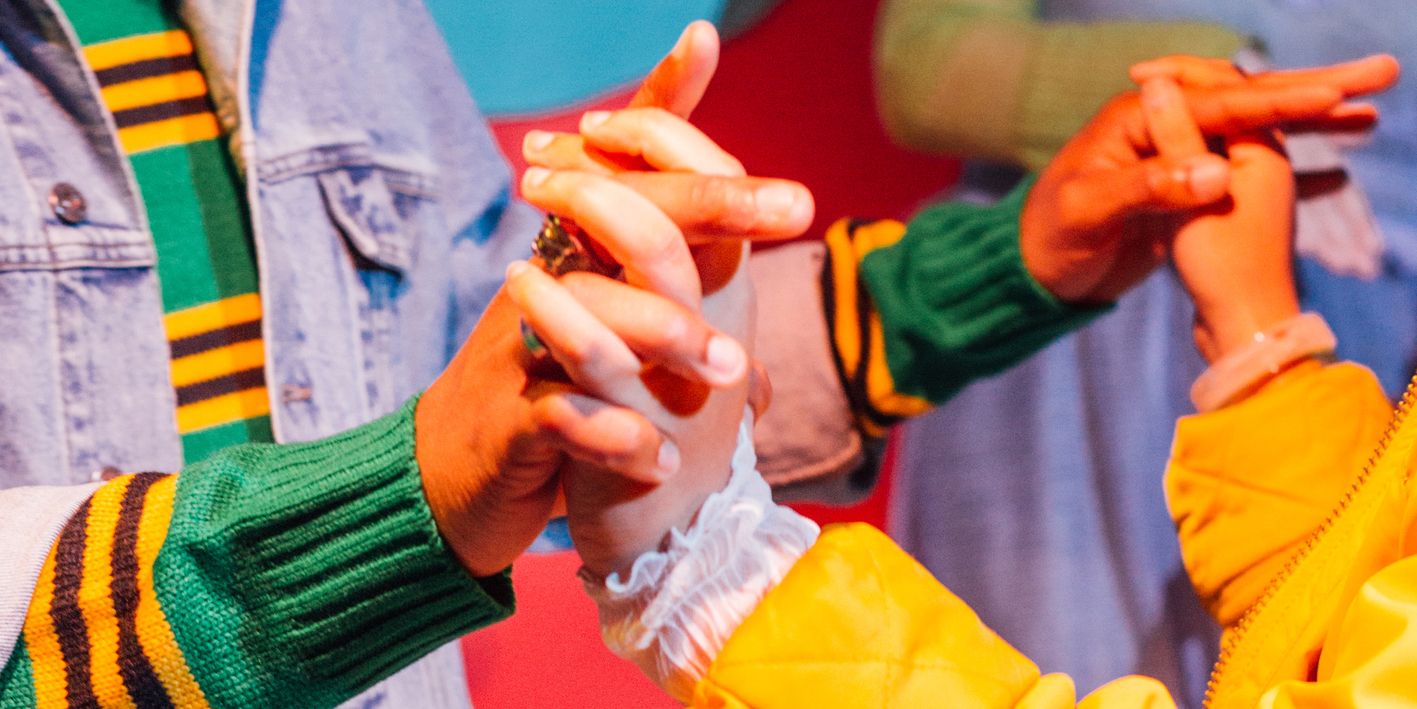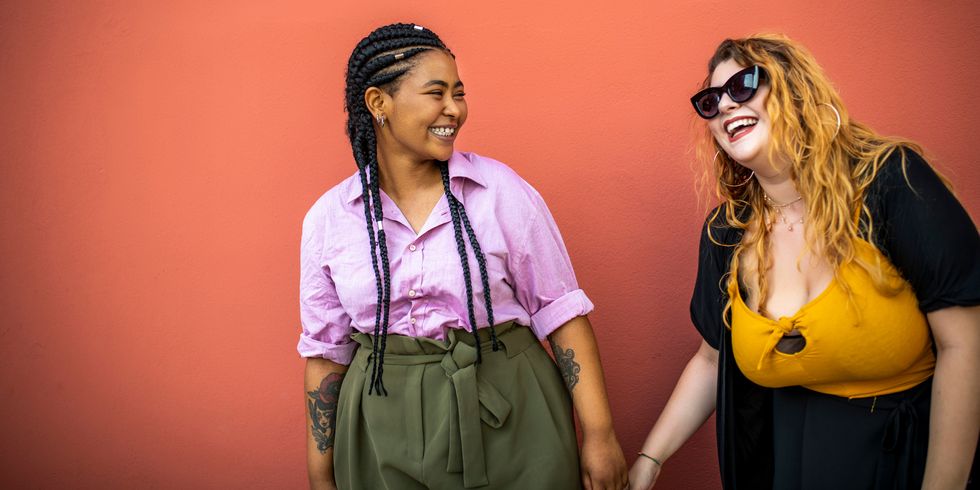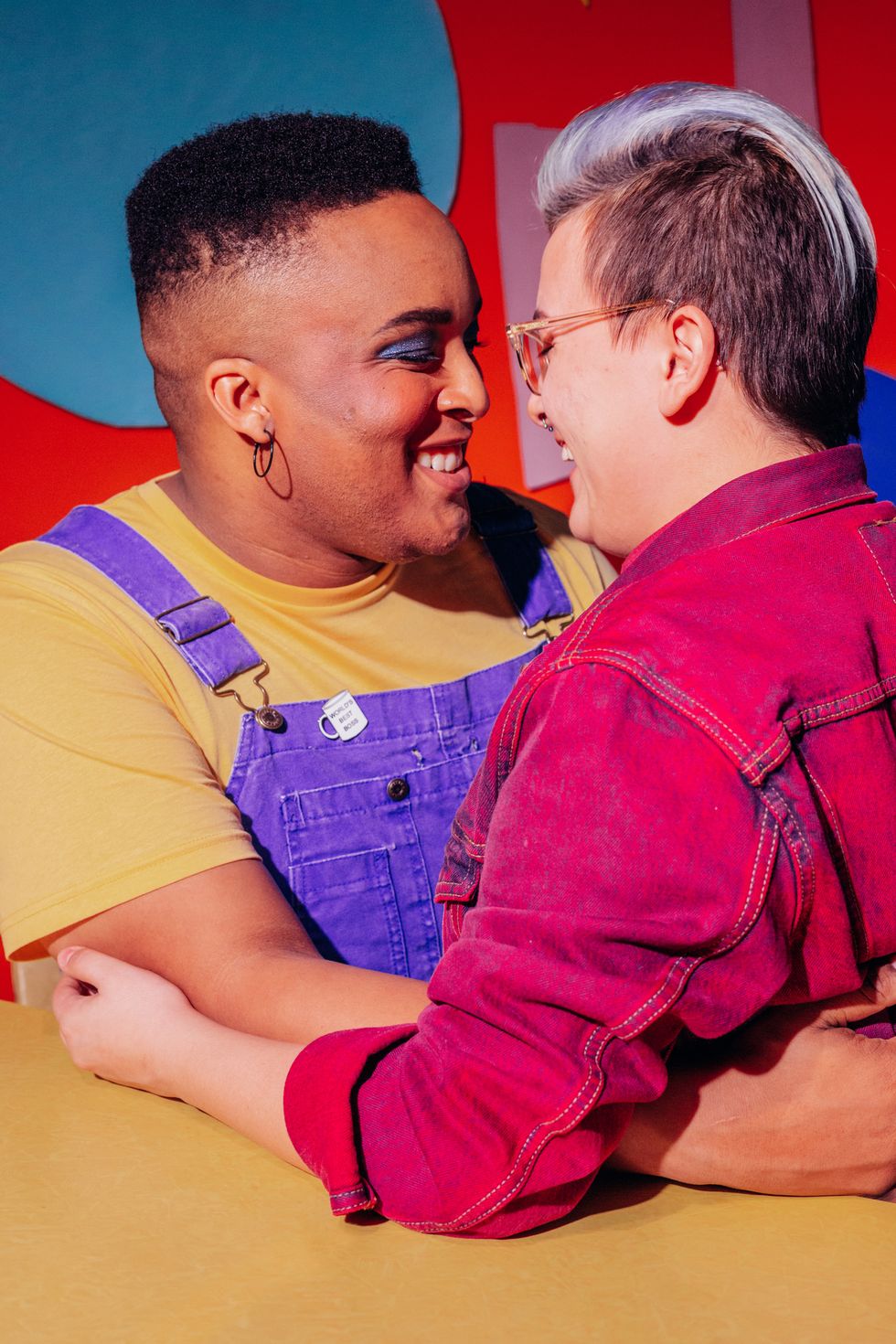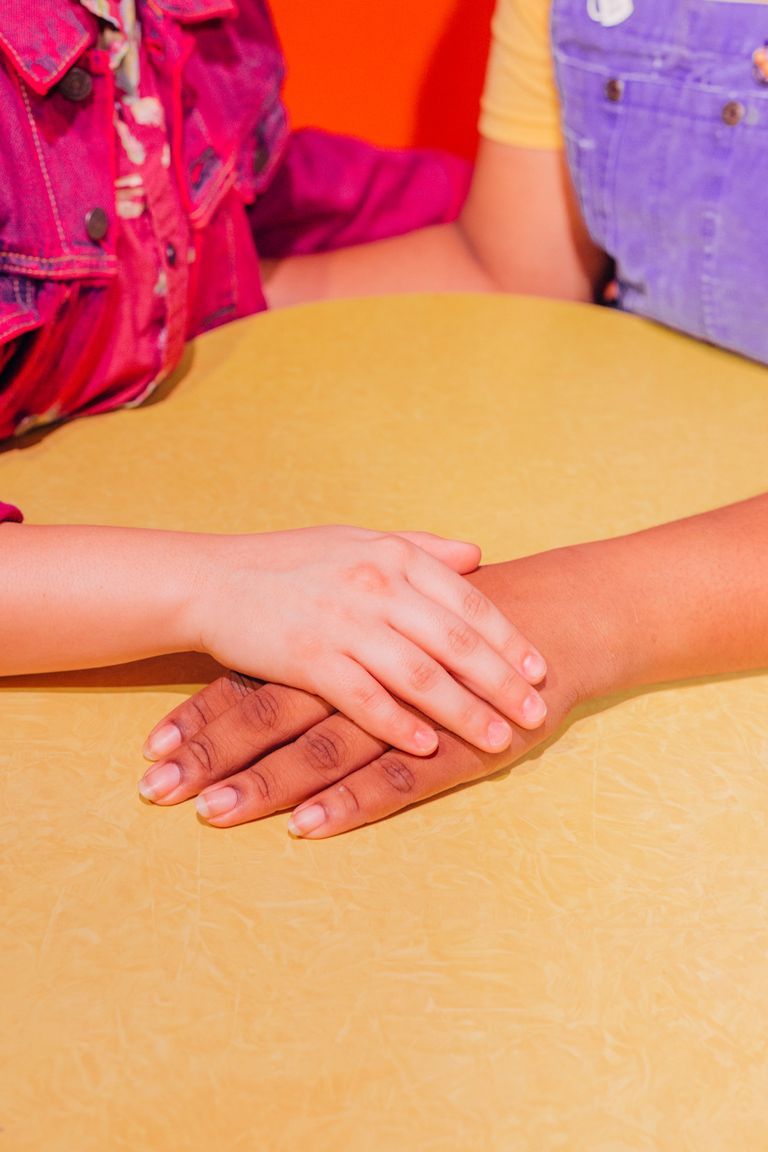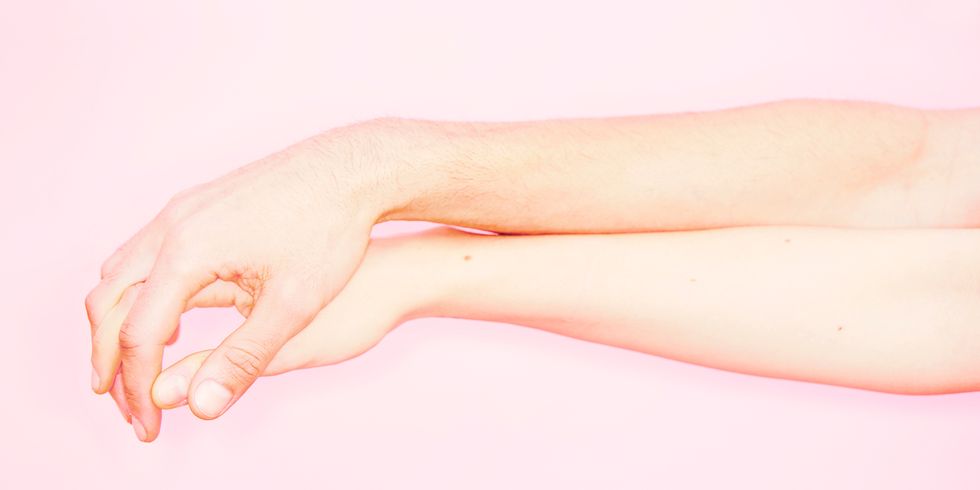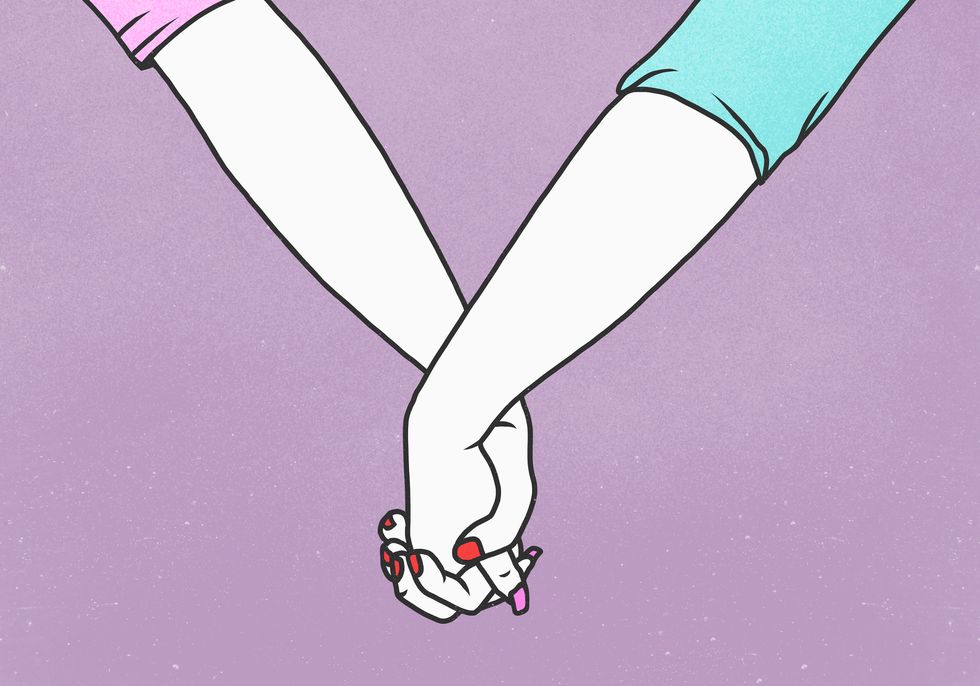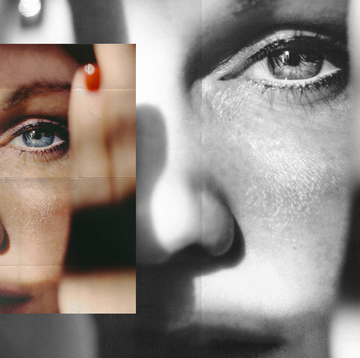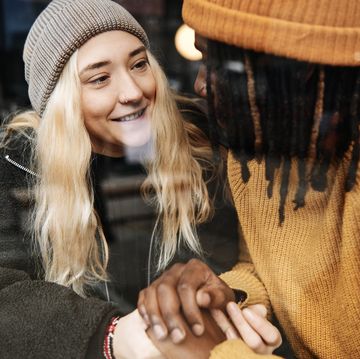Holding hands is something so many of us do, largely without even really thinking about it. Many couples will naturally often reach for the other's hand. But why? Is it because you just can't keep your literal hands off each other, or could it be because it's become routine? Are there any scientifically proven health benefits of holding hands with a romantic partner, friend, or parent/caregiver?
As psychotherapist Belynder Walia explains, hand holding is something humans have done for centuries. And it's a practice that's been subject to much research looking into why we have this impulse. "Regardless [of the reasons why we do it], the thought to take away is, hand-holding ultimately brings comfort, warmth, pain release and friendship to those who feel equally empathetic or compassionate," she says.
Why do we hold hands?
- Holding hands benefits our physical and mental health
- It can reduce physical and emotional pain
- It puts up in sync with our partners
- For some LGBTQ+ people, it's a political act
- It's a learned behaviour from childhood
- With a romantic partner(s), it shows affection and intimacy
- But holding hands can also be a form of control
- It can show platonic love in some cultures
We spoke to a number of experts and discovered there are a number of really surprising and interesting reasons why holding hands is such a common human behaviour. Here's what we learned...
1. Holding hands benefits our physical and mental health
Sure, grabbing your partner's hand feels nice. But according to science, the positive feelings go way deeper than that. "Many studies in neuroscience show that touch produces oxytocin, a feel-good chemical that is very good for your mental and physical health," says Silva Neves, a COSRT accredited psychosexual and relationship psychotherapist.
This chemical is actually a hormone and is involved in bonding, connection, trust-building, and empathy. Janina Scarlet, a clinical psychologist and author of Super-Women: Superhero Therapy for Women Battling Depression, Anxiety & Trauma, says it can "strengthen romantic bond and can also reduce physical and psychological pain." Janina points to research studies that show that a loving touch from a romantic partner can reduce pain perception, blood pressure, anxiety, and reactivity to stress.
A 2009 study by the University of California found women who were subjected to moderately painful heat stimuli experienced less discomfort while holding hands with their boyfriends, says Belynder Walia. "Pavel Goldstein, a postdoctoral pain researcher in the Cognitive and Affective Neuroscience Lab at CU Boulder, stated in the findings, 'This illustrates the power and importance of human touch.'"
"For individuals who are in high distress (such as from frustrating day, a past trauma, or upcoming stressors) loving physical touch, such as handholding can alleviate some of these factors. The helpful effects of handholding appear to be equally important in heterosexual and LGBTQ+ couples," Janina Scarlet adds.
Silva also says holding hands can regulate our nervous system. "The Touch Research Institute (TRI) asserts that holding hands is an integral part of connection and well-being, as the skin is a sensitive part of our body and is connected to our vagal system - which can regulate our nervous system."
Hand holding is also a positive way of managing negative emotions, says Dr Tony Ortega, clinical psychologist and author of #AreYouHereYet: How to STFU and Show Up For Yourself. "A study conducted in 2006 by James Coan and colleagues showed that hand holding reduces stress. This was verified by the use of MRI scans of participants’ brains."
2. Holding hands puts us in sync with our partner(s)
When people touch hands, they start to breathe in sync as shown in a later Goldstein study from 2018. As Silva Neves explains, this means "emotions will flow from one person to the other" - which is known as 'interpersonal synchronisation'. This is a phenomenon in which people physiologically mirror the people they're with.
"It appears that holding hands [also] serves the purpose to feel a deepening in human connections," he adds. But he points out this will only happen when you hold the hand of a person you love and trust.
Our hands are one of the most sensitive parts of our bodies, and Dr Becky Spelman says that when we hold hands, we are more finely attuned to one another’s feelings, emotions, and needs. "We are unconsciously exchanging emotional information with one another without necessarily registering it on a conscious level," she explains. "Instinctively, we can interpret much of what the other person is feeling from how they hold our hand, their pulse, the level of perspiration, and more."
3. For some people, holding hands can be political
You might think that in 2020, anyone can walk down the street holding hands. But with hate crimes against LGBTQ+ people - especially trans people of colour - on the rise, this isn't actually the case. For queer couples, holding hands isn't always simple. Many will have to weigh up whether they feel safe enough to do so, and may even adapt their hand holding behaviour depending on the environment they're in.
"Same-sex couples holding hands in public comes with courage and defiance," Silvs Neves says, "which is to be celebrated but needs consideration about safety, unfortunately. Thinking about where and when to hold hands is something that heterosexual couples never have to worry about, it probably doesn't even enter their mind, but it is a survival consideration for LGBTQ+ people. This is what we call 'minority stress', which can be chronic, depending on the location."
When LGBTQ+ couples do hold hands in a safe environment, the interpersonal synchronisation comes with all the same psychological benefits (reduces stress etc) as it does for cisgender and heterosexual couples." As the minority stress in the LGBTQ+ community may be chronic, we can argue that they need more loving touch to help relieve that stress!" Silva Neves adds.
Dr Tony Ortega agrees, saying that for LGBTQ+ couples, hand holding is a sign of, "We are just like everyone else." "It allows for the LGBTQ+ individual to not feel different anymore. I can now hold my partner's hand in public and not fear for my safety. It is empowering on a whole new level as it levels the playing field with our heterosexual counterparts."
4. Hand holding is a learned behaviour from childhood
Dr Becky Spelman, a psychologist at Private Therapy Clinic says hand holding is a behaviour so instinctive and ingrained that we don't even have to think about it. "Babies are born with a grasping reflex and will curl their tiny hands around any finger placed in their palm. Instinctively, they are already trying to hold hands. For the rest of our lives, most of us instinctively know when to reach out for someone else’s hand," she says.
"Holding hands is a way of keeping children safe and keeping them beside their parent, and it is also a way of demonstrating care and affection. Unlike other mammals, human beings transfer some of their childhood behaviours from the parent-and-child scenario to their romantic relationships in later life."
5. Holding hands is a way of showing our affection
Obviously, we hold hands with partners to show them we love them. And research shows that couples who often hold hands express less anger and more satisfaction with their relationship than those who do not.
Joanna Konstantopoulou, a psychologist and founder of Health Psychology Clinic, says hand holding also acts as a symbolic sign from a social perspective. "It symbolises passion and a strong connection between two people who deeply care about each other," she says.
But not all hand holding is romantic, as Dr Becky Spelman explains. "In some societies, close same-sex friends hold hands for similar reasons [as romantic partners do]; to express a sense of affection towards one another, and to enjoy the feeling of closeness from the skin to skin contact."
In India and Middle Eastern countries, it is common to see two heterosexual individuals of the same gender holding hands, and especially men says Belynder Walia. "If you recall, even President Bush was holding hands with the Crown Prince Abdullah of Saudi Arabia. This was seen as a common gesture of care and friendship."
6. We even naturally do it with strangers in times of crisis
But it's not just friends, parents, caregivers and romantic partners that we hold hands with instinctively. "In all cultures, we tend to hold hands with someone who is grieving or in pain as a way of indicating our support to them," says Dr Becky Spelman. "In very difficult circumstances, even complete strangers may grasp one another’s hand to comfort and engage with one another. Survivors of crash landings, for example, often describe reaching out for the hand of the person sitting next to them.
"Also, nurses and other caregivers in hospital often describe finding some time in their busy day to hold the hand of someone who is dying alone." And as we know, the research indicates that hand holding in these circumstances really does make a difference— as it can reduce stress and pain.
7. Holding hands can indicate control
Dr Elena Touroni, a consultant psychologist and co-founder of The Chelsea Psychology Clinic, says "there may be certain situations where it’s used to express possessiveness and ownership."
Dr Becky Spelman agrees, saying it can be used "as a dominating gesture of control". She explains, "In an abusive relationship, for example, a controlling partner might like to hold their partner’s hand as a way of limiting their movement and firmly, if implicitly, instructing them that they're in charge."
"I have had clients state they hold their partner's hand in public to avoid their partner getting hit on," Dr Tony Ortega adds.
And, often the way people hold hands can give away a lot. As Dr Spelman continues, "In these situations, their hand is likely to be on top of their partners, and the hold firm enough that it would be difficult for their partner to disengage without consent. Similarly, while parents typically hold their children’s hands in a loving and caring way, when they feel that they child has misbehaved, the experience of holding hands may feel more punitive than caring to the child."
